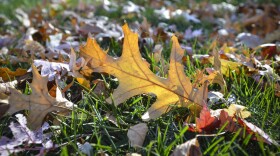-
Scientists say leaving autumn leaves on the ground can add important nutrients to the soil and create needed habitat for insects.
-
The Dust Bowl led to the creation of what is now called the Natural Resources Conservation Service. Just as it celebrates a major milestone, the agency is dealing with job losses, massive proposed budget cuts and talk of consolidation.
-
A rare dust storm in Illinois this month caused a 72-car pileup on an interstate. Climate experts say it points to a bigger problem — soil erosion.
-
The National Fish and Wildlife Foundation has awarded nearly $3 million dollars in grants to plant cover crops in six Midwestern states The funding comes as demand for state and federal incentive programs for cover crops often outpaces available funding.
Play Live Radio
Next Up:
0:00
0:00
Available On Air Stations




